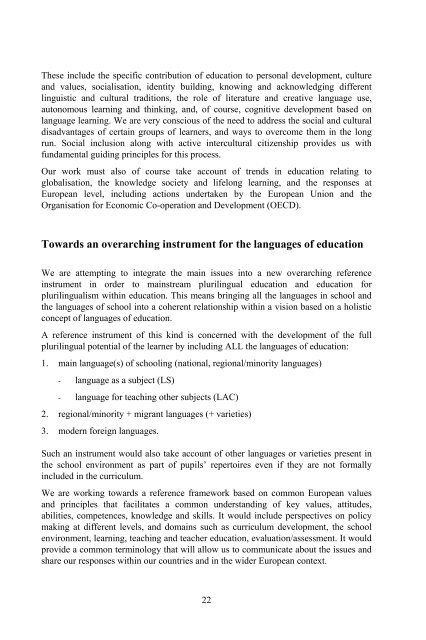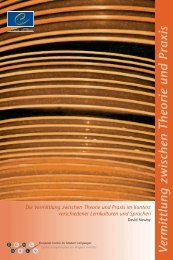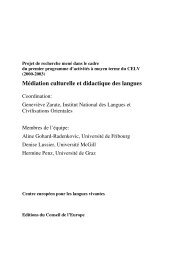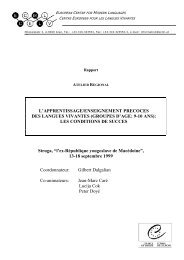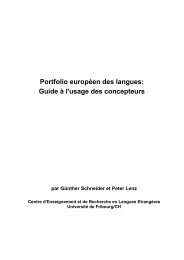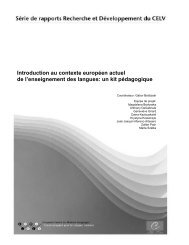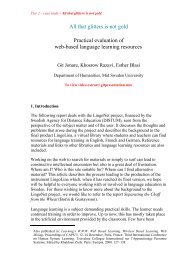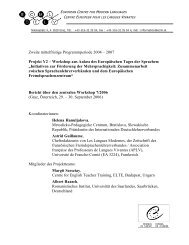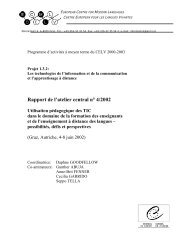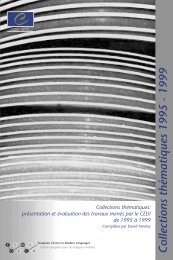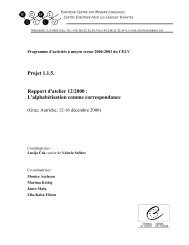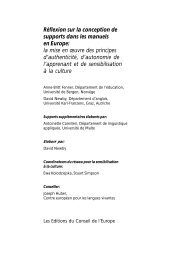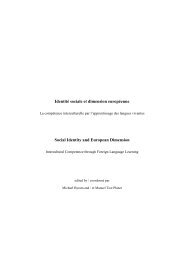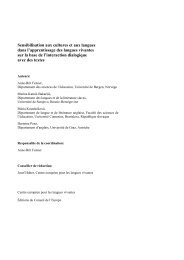cohesion - European Centre for Modern Languages
cohesion - European Centre for Modern Languages
cohesion - European Centre for Modern Languages
Create successful ePaper yourself
Turn your PDF publications into a flip-book with our unique Google optimized e-Paper software.
These include the specific contribution of education to personal development, culture<br />
and values, socialisation, identity building, knowing and acknowledging different<br />
linguistic and cultural traditions, the role of literature and creative language use,<br />
autonomous learning and thinking, and, of course, cognitive development based on<br />
language learning. We are very conscious of the need to address the social and cultural<br />
disadvantages of certain groups of learners, and ways to overcome them in the long<br />
run. Social inclusion along with active intercultural citizenship provides us with<br />
fundamental guiding principles <strong>for</strong> this process.<br />
Our work must also of course take account of trends in education relating to<br />
globalisation, the knowledge society and lifelong learning, and the responses at<br />
<strong>European</strong> level, including actions undertaken by the <strong>European</strong> Union and the<br />
Organisation <strong>for</strong> Economic Co-operation and Development (OECD).<br />
Towards an overarching instrument <strong>for</strong> the languages of education<br />
We are attempting to integrate the main issues into a new overarching reference<br />
instrument in order to mainstream plurilingual education and education <strong>for</strong><br />
plurilingualism within education. This means bringing all the languages in school and<br />
the languages of school into a coherent relationship within a vision based on a holistic<br />
concept of languages of education.<br />
A reference instrument of this kind is concerned with the development of the full<br />
plurilingual potential of the learner by including ALL the languages of education:<br />
1. main language(s) of schooling (national, regional/minority languages)<br />
- language as a subject (LS)<br />
- language <strong>for</strong> teaching other subjects (LAC)<br />
2. regional/minority + migrant languages (+ varieties)<br />
3. modern <strong>for</strong>eign languages.<br />
Such an instrument would also take account of other languages or varieties present in<br />
the school environment as part of pupils’ repertoires even if they are not <strong>for</strong>mally<br />
included in the curriculum.<br />
We are working towards a reference framework based on common <strong>European</strong> values<br />
and principles that facilitates a common understanding of key values, attitudes,<br />
abilities, competences, knowledge and skills. It would include perspectives on policy<br />
making at different levels, and domains such as curriculum development, the school<br />
environment, learning, teaching and teacher education, evaluation/assessment. It would<br />
provide a common terminology that will allow us to communicate about the issues and<br />
share our responses within our countries and in the wider <strong>European</strong> context.<br />
22


